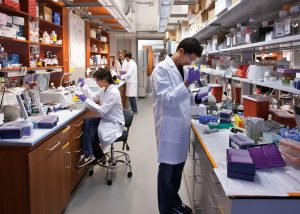Master's Program
At the University of Pennsylvania, the M.S.E. in Chemical and Biomolecular Engineering is primarily a degree for students who wish to prepare themselves for research and development activities by obtaining a more solid foundation in the principles of chemical and biomolecular engineering.
The primary goal of the Penn CBE master’s program is to provide students with a customized curriculum designed to prepare them to function creatively and independently in industry, research, and development, government, or academia.
The master’s degree program provides rigorous and advanced training in engineering allowing for limited specialization in one of several fields, including fluid mechanics, thermodynamics, control, design, bioengineering, polymer engineering, heat transfer, scientific computing, and computer applications.
The flexible curriculum allows students to select their own graduate coursework in math, chemical engineering, and other science and engineering disciplines. The University of Pennsylvania has a “one university” philosophy, and students may register for courses from any School in the University.
CBE master’s degree candidates select either the thesis or non-thesis degree track during their first year, in consultation with the Graduate Group Chair. Students typically complete their degree program in twelve to eighteen months.
Graduate Tracks
Advanced Materials & Nanotechnology
This field focuses on the development and application of new materials with unique properties at the nanoscale. It includes nanomaterials, smart materials, and materials with enhanced mechanical, electrical, or thermal properties.
Chemical and biomolecular engineers work on creating and characterizing advanced materials for use in a variety of applications, from electronics to biomedical devices.
Click here to learn more.
Biotechnology & Pharmaceuticals
This field focuses on the application of biological systems and processes to develop new drugs, therapies, and diagnostic tools. It includes drug delivery systems, tissue engineering, and the development of biopharmaceuticals.
Chemical and biomolecular engineers contribute to this field by designing and optimizing processes for the production of pharmaceuticals, developing new biomaterials, and advancing techniques for drug delivery and diagnostic applications.
Click here to learn more.
Computational Sciences & Machine Learning
This category includes the use of computational methods, simulations, and machine learning to solve complex problems in chemical and biomolecular engineering. It involves modeling chemical processes, predicting material behaviors, and analyzing large datasets.
Computational tools and machine learning techniques are increasingly used to accelerate research, optimize processes, and design new materials by providing insights that are difficult to obtain through experimental methods alone.
Click here to learn more.
Energy, Sustainability, & Environment
This category encompasses research aimed at addressing energy challenges, environmental impact, and sustainability. It includes the development of renewable energy sources, efficient energy storage, and technologies to reduce environmental pollution.
In chemical and biomolecular engineering, these efforts are crucial for developing processes and materials that support sustainable practices and mitigate environmental harm. Research in this area often involves designing new catalysts for energy conversion or systems for carbon capture and recycling.
Click here to learn more.
Innovation & Entrepreneurship
This category covers activities related to the commercialization of new technologies, startup ventures, and innovative business practices. It includes developing business strategies, securing funding, and bringing new technologies to market.
Engineers in this field leverage their technical expertise to create and scale new technologies and products. This involves translating research innovations into viable commercial products and navigating the entrepreneurial landscape to drive industry advancements.
Click here to learn more.
Process Control & Design
This area involves the development and optimization of processes used in the chemical and pharmaceutical industries. It includes designing efficient and safe chemical reactors, separation processes, and systems for monitoring and controlling manufacturing operations.
Effective process control and design are essential for scaling up laboratory discoveries to industrial production. Engineers in this field work on improving process efficiency, safety, and cost-effectiveness.
Click here to learn more.
Soft Matter & Complex Fluids
Research in this category deals with materials that are easily deformed by external forces, including polymers, gels, and liquid crystals. It also covers the study of complex fluids with intricate behaviors, such as suspensions and emulsions.
Chemical and biomolecular engineers explore how these materials behave and interact under various conditions, leading to innovations in product formulations, coatings, and other applications where material properties are critical.
Click here to learn more.

